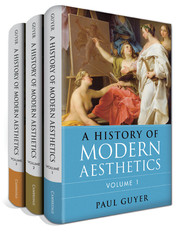Book contents
- Volume 1 The Eighteenth Century
- Frontmatter
- Epigraph
- Contents
- Acknowledgments
- Introduction
- 1 Prologue
- Part One Aesthetics in Britain, 1725–1800
- Part Two French Aesthetics in Mid-Century
- Part Three German Aesthetics between Wolff and Kant
- 6 The First Generation of Wolffian Aesthetics
- 7 German Aesthetics at Mid-Century
- 8 Breaking with Rationalism
- Part Four Kant and After
- Bibliography
- Index
- Volume 2 The Nineteenth Century
- Volume 3 The Twentieth Century
- References
6 - The First Generation of Wolffian Aesthetics
from Part Three - German Aesthetics between Wolff and Kant
Published online by Cambridge University Press: 05 June 2015
- Volume 1 The Eighteenth Century
- Frontmatter
- Epigraph
- Contents
- Acknowledgments
- Introduction
- 1 Prologue
- Part One Aesthetics in Britain, 1725–1800
- Part Two French Aesthetics in Mid-Century
- Part Three German Aesthetics between Wolff and Kant
- 6 The First Generation of Wolffian Aesthetics
- 7 German Aesthetics at Mid-Century
- 8 Breaking with Rationalism
- Part Four Kant and After
- Bibliography
- Index
- Volume 2 The Nineteenth Century
- Volume 3 The Twentieth Century
- References
Summary
As we saw in Chapter 1, Christian Wolff defined the experience of beauty as the “sensitive cognition of perfection.” Cognition is naturally understood as knowledge of truth, so in the first instance Wolff’s formula meant that the experience of beauty is knowledge of true perfection by means of the senses. In Wolff’s Leibnizian metaphysics, the perfection of anything should be its status as a part of the best possible world and its reflection of the perfection of that world as a whole, although as we also saw Wolff’s notion of perfection was broad enough to include successful adaptation to an intended purpose, and thus in his analysis of our experience of architecture he emphasized our sense of the utility of structures as well as a sensory response to the kind of abstract form that could be considered an object of cognition. But it was the idea that aesthetic experience is a sensory apprehension of truth that dominated in Wolff’s most general statements. After 1720, Wolff’s philosophy enjoyed an influence in most parts of Germany similar to that which the philosophy of Locke by then exercised in most parts of Britain and in France for much of the eighteenth century as well. So the history of German aesthetics after Wolff is a history of the attempt to find room for a fuller account of aesthetic experience within a framework that privileges the idea of cognition, and only very gradually was room found for the idea that the free play of our mental powers including both imagination and emotion could be equally important. (In Volume 2, we shall see that this effort to acknowledge these other aspects of aesthetic experience starting from within a purely cognitivist paradigm replayed itself over the course of nineteenth-century German aesthetics.)
- Type
- Chapter
- Information
- A History of Modern Aesthetics , pp. 305 - 340Publisher: Cambridge University PressPrint publication year: 2014



